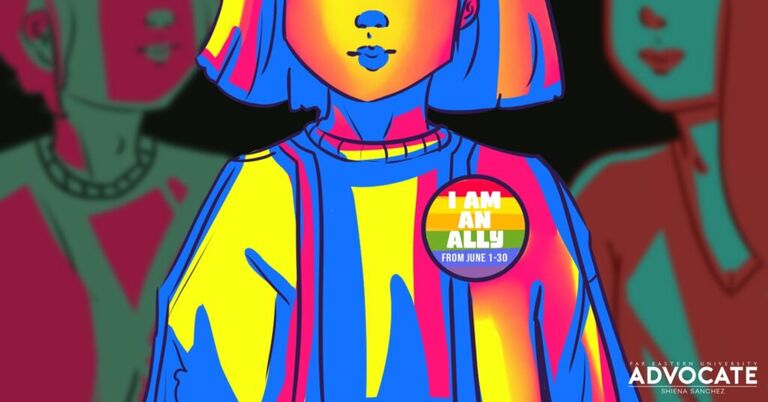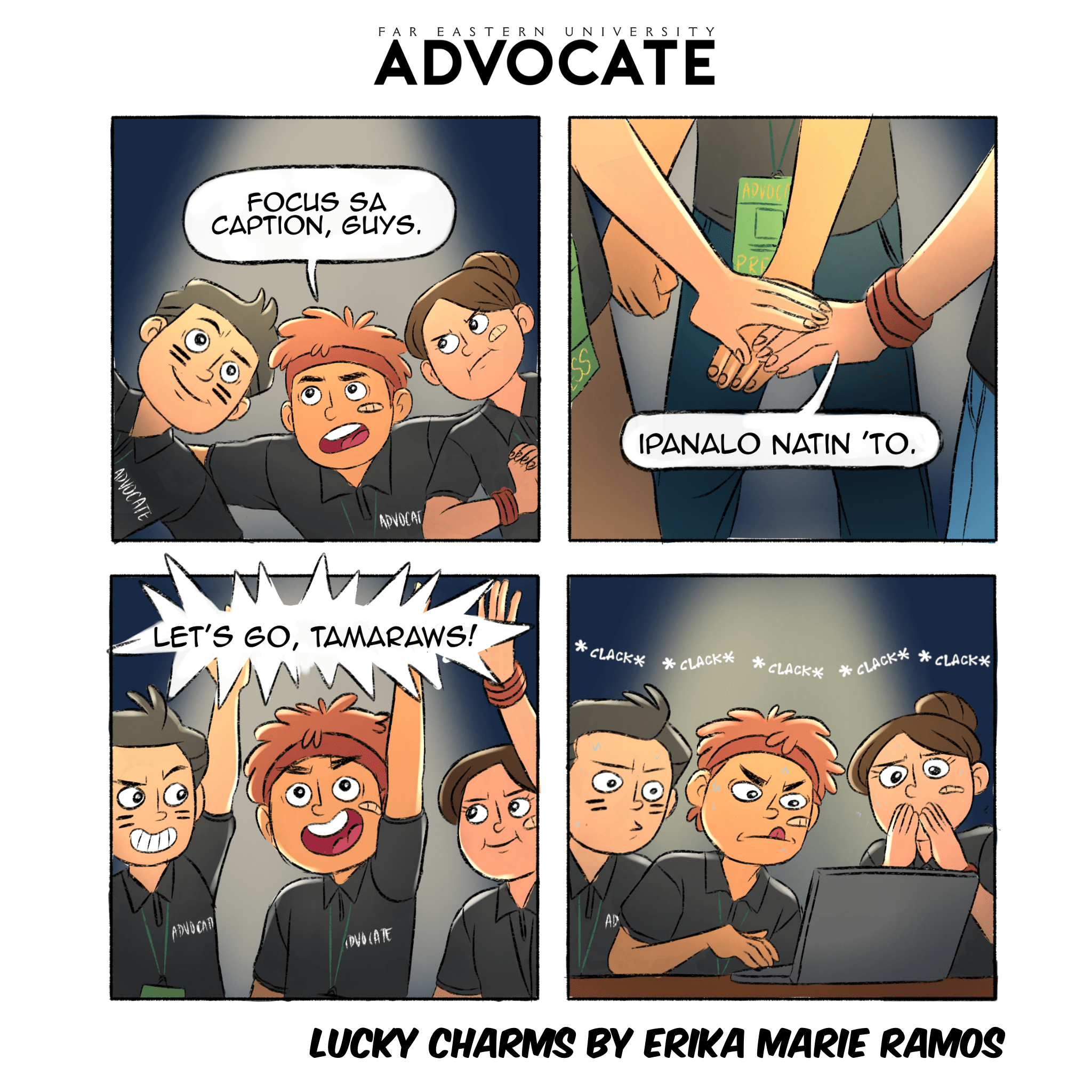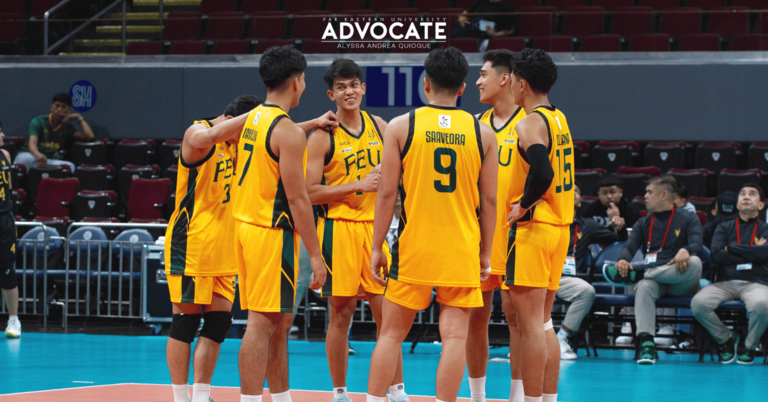
IARFA SC prexy on student apathy: ‘Exists even outside election matters’
- May 12, 2025 15:23
FEU Advocate
June 29, 2023 12:51

By John Vincent C. Cruz
It's almost the end of June—a sea of multi-colored decor adorns the public streets while minorities unapologetically celebrate their queerness. This sighting is practically inescapable, the rainbow flags that represent the diverse members of the Lesbian, Gay, Bisexual, Transgender, Queer, Intersex, and Asexual (LGBTQIA+) community. But after every Pride Month, the colors immediately lose their hue as society moves onward while minorities find themselves back where they started.
One cannot deny the fact that Pride Month is a cultural phenomenon—a month-long commemoration of beautiful yet highly misconstrued individuals of society.
Throughout the years, fascination grew over the colorful event thanks to its direct link with popular culture; hence, drag queens, gender nonconforming fashion, and loving any gender became more acceptable.
However, with the rising trends of rainbow-themed merchandise being mass-produced and performative activism, one can get lost in what Pride Month truly represents.
Celebrating Pride is more than waving rainbow flags, watching drag shows, and saying ‘yas queen!’ remarks. It is a protest, a flame that sparks conversations usually not talked about even up to this day. With the continuous discrimination and lack of legislation to protect the LGBTQIA+ community, Pride will always remain true to its essence, a public demonstration against pervasive bigotry.
Tracing back to the event’s roots, the 1969 Stonewall Riots was the impetus for the gay rights movement during a challenging time when homosexuality was deemed a mental disorder. Back then, queer people only found salvation inside gay clubs where they openly expressed their sexuality.
In the Philippines, the first known records of queerness were the babaylans, usually portrayed in Filipino folklore as powerful women. But there were also gender-crossing men with the same standing as the babaylans, called asogs. These magical healers had the complete liberty to romance with another man.
Even our own mother tongue utilizes gender-neutral pronouns ‘siya,’ ‘niya,’ and ‘kanya.’ More importantly, the Philippines became the first country in Asia to ever conduct a Pride March on June 26, 1994.
Society has seemingly shied away from the traumatizing discrimination that once haunted and even pushed minority members into a deep depression. This, unfortunately, has not been the case for most people who belong to the LGBTQIA+ community.
Recent studies show that lesbians, gay men, bisexuals, or transgender people are more likely to have signs of anxiety and depression compared to people who are not part of the queer community.
Not only do these bright, queer people have to deal incessantly with derogatory acts, but they also have to figure out how to navigate through the immense pressure brought by social stressors.
Moreover, the lack of protection against hate crimes toward the LGBTQIA+ community makes everything much worse. The Sexual Orientation, Gender Identity, Gender Expression, or Sex Characteristics (SOGIESC) Equality Bill has yet to be passed as lawmakers still have reservations on the matter, primarily due to religious conflicts.
More than two decades have passed since its first draft, and the backlash towards the bill became so controversial that it became the ‘longest-running bill under the Senate interpellation period in the Philippines.
Senate Majority Leader Joey Villanueva made headlines as he spoke about the SOGIESC bill, the only hope we have for better protection, as ‘not urgent.’ Ironically, Villanueva was one of the co-authors of the bill in 2016.
The lack of legislation prioritizing the community's safety and welfare proves to be a significant risk. Hate crimes are prevalent in the country—from the 2014 brutal murder of Jennifer Laude to the 2019 unjust arrest of a transwoman barred from using the women’s restroom in a mall.
Looking on the bright side, the government of Quezon City recently initiated the ‘Right to Care’ Card, which authorizes LGBTQIA+ couples to make critical decisions when their partners are rushed to the hospital. This small yet profound step towards equality already means a lot to minorities.
But without the existence of any proper amendments that push for the fundamental human rights of the LGBTQIA+ community, gender-based violence and injustices will inevitably persist.
The queer students longing for freedom and self-expression were delighted to discover the inclusive norms inside the hallways of Far Eastern University (FEU).
In 2018, the University established the Gender and Development Desk (GADD) to alleviate the gender-based violence on the green-and-gold campus. That same year, the FEU Sexuality and Gender Alliance (SAGA) was conceived to further advocate gender equality among students.
All-gender restrooms (AGR) were also introduced the following year to help break the stigma towards queer people.
Gender and Development, an elective course offered to Communications students, is also available, while some fragments of it are also included in other courses such as Understanding the Self, Culture, Society, Ideas, and Innovations (CSII), and Talakayan sa Makabuluhang Araling Pangkultura, Panlipunan at Reyalistikong Usapin sa Wika (TAMARAW).
Despite these attempts to promote inclusiveness, only some genders are at the forefront while others are forgotten, given the broad spectrum in the community.
In an interview with FEU Advocate, GADD coordinator and FEU SAGA adviser Ameerah Milano M.A. shared her insights on the internal issues within the group minority.
“Marami rin tayong ikinakaharap na problema sa loob ng ating komunidad… Yes, priority kayong lahat pero at this certain time, ito muna ang kailangan natin i-angat kasi kapag umangat ‘yan, aangat tayong lahat. (We also face many problems within our community… Yes, you are all a priority but at this certain time, this is what we need to raise first because when that rises, we will all rise),” she shared.
Mika Bengan (she/her, they/them), a non-binary demisexual lesbian and incoming second-year Bachelor of Science (BS) Nursing student, shared their frustration with constantly explaining their sexual identity to people.
“I can’t blame them because they have preconceived notions of what asexual means… It’s very tiring. Whenever I introduce myself, I just leave out the asexual part and just say I’m a lesbian kasi nakakapagod na siya i-explain (because it is tiresome to explain it),” they expressed.
Luckily for the sophomore student, they found a small group of demisexual people who understands every part of them.
“I think that was the first moment since high school na nagkaroon ako ng [that I had a] circle of friends where I truly felt comfortable in,” Bengan shared.
Incoming second-year BS Nursing student Maia San Diego (she/her, they/them), who identifies as a closeted aromantic asexual, also found solace with their newfound college friends.
In addition to the dated beliefs of their parents, the aspiring nurse was once so puzzled about their sexual identity. But when San Diego decided to look for answers online, they stumbled upon the term ‘aromantic asexual.’
“I never felt so seen. Parang ‘di lang pala ako ‘yung ganoon kahit small community kami (It seems that I'm not the only one like that even though we are a small community),” they recalled.
However, Milano highlighted how polarizing it can be for people like Bengan and San Diego to understand and figure out who they are immediately.
“Ang nakakalungkot din para sa ating mga pansexual, non-binary, [at] asexual, hindi sila nag-uumpisa na alam nila kung ano sila eh. And then sa pangalawang beses nila na pag-come out or pangatlo or pang-apat, mas nagiging harsh sa kanila ang lipunan (The sad thing is for our pansexuals, non-binary, [and] asexuals, they don't start knowing what they are. And then the second time they come out or the third or fourth time, society becomes more harsh on them),” she highlighted.
While these compelling stories of unconditional love and acceptance are great to hear, this is just the start of something bigger. Milano also shared that the FEU plans to keep up with the students’ advocacy to foster a safe environment for all genders.
This includes data-gathering to determine the population of the LGBTQIA+ community inside the University to help create better policies. One of the planned initiatives is to develop a General Education course dedicated to gender awareness.
More than ever, the LGBTQIA+ community needs support from its allies—whether by deliberately fighting against any form of discrimination or encouraging others to turn the other cheek.
For some, like big corporations and brands, their support can be translated to rainbow-themed products being mass-produced as soon as June begins.
Ronne Mouren Fajardo (he/him), an incoming fourth-year BSBA Marketing Management student who identifies as bisexual, asserted that businesses consider Pride Month as a cash grab.
“People [LGBTQIA+ community] would feel good about being appreciated by these companies during that month. But to them, companies see this as a profit opportunity to feed on people in the community,” Fajardo voiced.
However, for Milano, she gave them the benefit of the doubt, making it a starting point for them to learn more about what it means to be an ally. She argued the fact that corporations actively participating every Pride Month is already a display of awareness. Still, she agreed that more work is needed to instill the essence of the celebration in these business executives.
As a cisgender woman, the GADD coordinator knew much about her privilege compared to her queer students. The faculty member also challenged her fellow allies to do better and share their privilege among marginalized people.
“Kapag ally ka, hindi siya tungkol sa kung ano lang ‘yung nagagawa mo. Pero ang tanong, ano ‘yung espasyo na willing ka na ibigay doon sa komunidad? Kasi ikaw pabor na sa ’yo ang sistema (When you're an ally, it’s not just about what you do. But the question is, what is the space that you are willing to give to the community? Because the system is already in your favor),” she remarked.
Society truly needs to establish policies that cater to the needs of the queer community. It should never be questioned nor belittled by anyone. The plight of being unable to express oneself entirely is one thing, but failing to acknowledge their fundamental rights is beyond condescending and dreadful to watch.
“‘Para bang sinabi mo na walang lugar ang pagpapakatao sa bansa natin. Para bang sinabi mo sa amin na ‘Wala akong pakialam sa inyo, hindi kayo mahalaga, at bahala kayo’ (It’s like you told us that to simply be a human being has no place in our country. It's like you told us 'I don't care about you, you're not important, and you're on your own'),” Milano said.
But as long as unconditional love perseveres among the queer community, every day is still a chance to make significant changes within the system.
“We’re still fighting for our rights, a fight that shouldn’t happen in the first place. Because at the end of the day, we’re all still people who long to love who we love,” Bengan expressed.
Given its historical, cultural, and political relevance, Pride Month is more than the surface-level society chooses to tolerate. While we celebrate better queer representation and each one’s individuality, let us remember those who continue to live inside the closet due to the fear of being unconventional. Moreover, let us continue to fight for those who have perished under unjust circumstances.
The path toward the rainbow brick road may seem elusive, but it is not impossible to find. As long as we support each other and ensure that no one is left behind, genuine equality can be achieved by the queer community. That itself is a feat that no trend or fad could ever top. But for now, the journey towards this endeavor doesn't end in Pride as it lives on once fairness is served rightfully.









